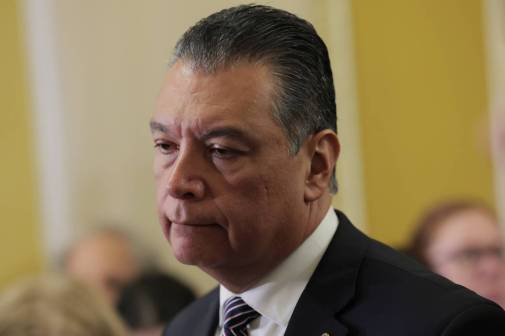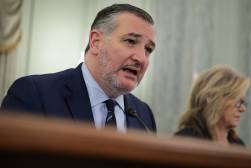A report from the Brennan Center for Justice shows that 61% of local election officials are concerned with CISA’s recent scaling back of cybersecurity services.
Listen to this article
0:00
Learn more.
This feature uses an automated voice, which may result in occasional errors in pronunciation, tone, or sentiment.

A majority of local election officials are worried about the federal government’s recent moves to pull back support for election security services, according to a report published Thursday by the Brennan Center for Justice, a nonprofit public policy institute.
The report, which arrives amid numerous cuts to services and staff at the Cybersecurity and Infrastructure Security Agency, found that 61% of local election officials polled said they were specifically concerned about election security services cut by CISA. And of the 858 local election officials who responded, 87% said they believe it’s important that state and local governments fill the gaps in support created by the federal government’s cuts under the second Donald Trump administration.
Lawrence Norden, a vice president of elections and government at the Brennan Center who helped conduct the survey, said the government landscape is already shifting to ensure election offices can protect their systems and share timely threat information.
“I think it has to happen,” Norden said. “And not all of this stuff necessarily requires money. It requires better coordination across government agencies. Some states have already started doing some of this — it just needs to be extended more.”
The Brennan Center report follows a scolding letter sent on Monday by congressional Democrats demanding that CISA disclose the level of support it’s providing to state and local election offices. Rep. Joseph D. Morelle, of New York, and Sen. Alex Padilla, of California, wrote that their concerns stem from news reports disclosing that hundreds of positions at the federal agency may soon be axed, along with rumors that “CISA staff may be afraid to work with state and local election officials and vendors for fear of retribution.”
Minnesota Secretary of State Steve Simon said in an email to StateScoop Thursday that the federal cuts to election security this year have been “dramatic and unexpected,” but that his state is keeping elections “free, fair, accurate, and secure” by providing resources to local election officials, including through an “in-house election security navigator team dedicated to providing individual support to local election officials.”
He also pointed to a state account, started in 2023, that his office uses to dispense funding to localities to pay for expenses, including “cybersecurity and security-related infrastructure.” The fund currently receives $3 million annually.
“We are also in contact with the federal government to advocate for appropriate elections funding and resources,” Simon said. “Further, we are working with other states to find opportunities to work together to provide low or no-cost election security resources to localities.”
Fifty-nine percent of election leaders told the Brennan Center that they’re also concerned about political leaders interfering in election administration.
They also reported facing elevated levels of threats, harassment and abuse from the public. Thirty-eight percent said they’ve experienced some form of threat or abuse, with 63% of such incidents occurring in person.
Many current and former election officials have told StateScoop in recent months that they’re alarmed about the prospects of keeping the nation’s election systems secure, particularly after CISA cut funding this year from two information-sharing organizations: the Elections Infrastructure Information Sharing and Analysis Center and the Multi-State ISAC.
In statements to StateScoop around the time of the cuts, CISA explained that funding at the information-sharing groups was cut because the services were duplicative with those it was already providing. The Center for Internet Security told StateScoop last April that it will provide gap funding for the MS-ISAC, which lost about $8.5 million in federal funding, so that it can continue to support state and municipal cybersecurity efforts.
Norden said states will likely need to “get creative” in finding ways to provide cybersecurity services for elections, like vulnerability scanning and running network intrusion detection sensors, that have in recent years been provided by CISA or funded by CISA through the Center for Internet Security.
In response to a question about election security, CISA on Monday told StateScoop that its agenda includes an increased focus on partnering with the private sector to secure the nation. Norden said that such partnerships can be valuable, but pointed out that the services that were provided by the nonprofit EI-ISAC, which saw its support cut by CISA, represented one of the most prominent examples of a successful public-private partnership that bolstered security. Further complicating matters, 28 states have since the 2020 election passed laws prohibiting their election offices from accepting private funding or free assistance from private organizations. (The Center for Internet Security has circumvented this rule through its formal association with CISA.)
“I don’t want to say only the federal government can do it, but when it comes to responding to foreign cyberattacks and interference, when it comes to information-sharing, the federal government is obviously in a much stronger position to coordinate than state or local governments are,” Norden said, adding that for state and local governments, it will be “more of a challenge” to create such supports. “For an agency like CISA, they are communicating across the country with officials. They can see patterns in terms of what’s happening.”







